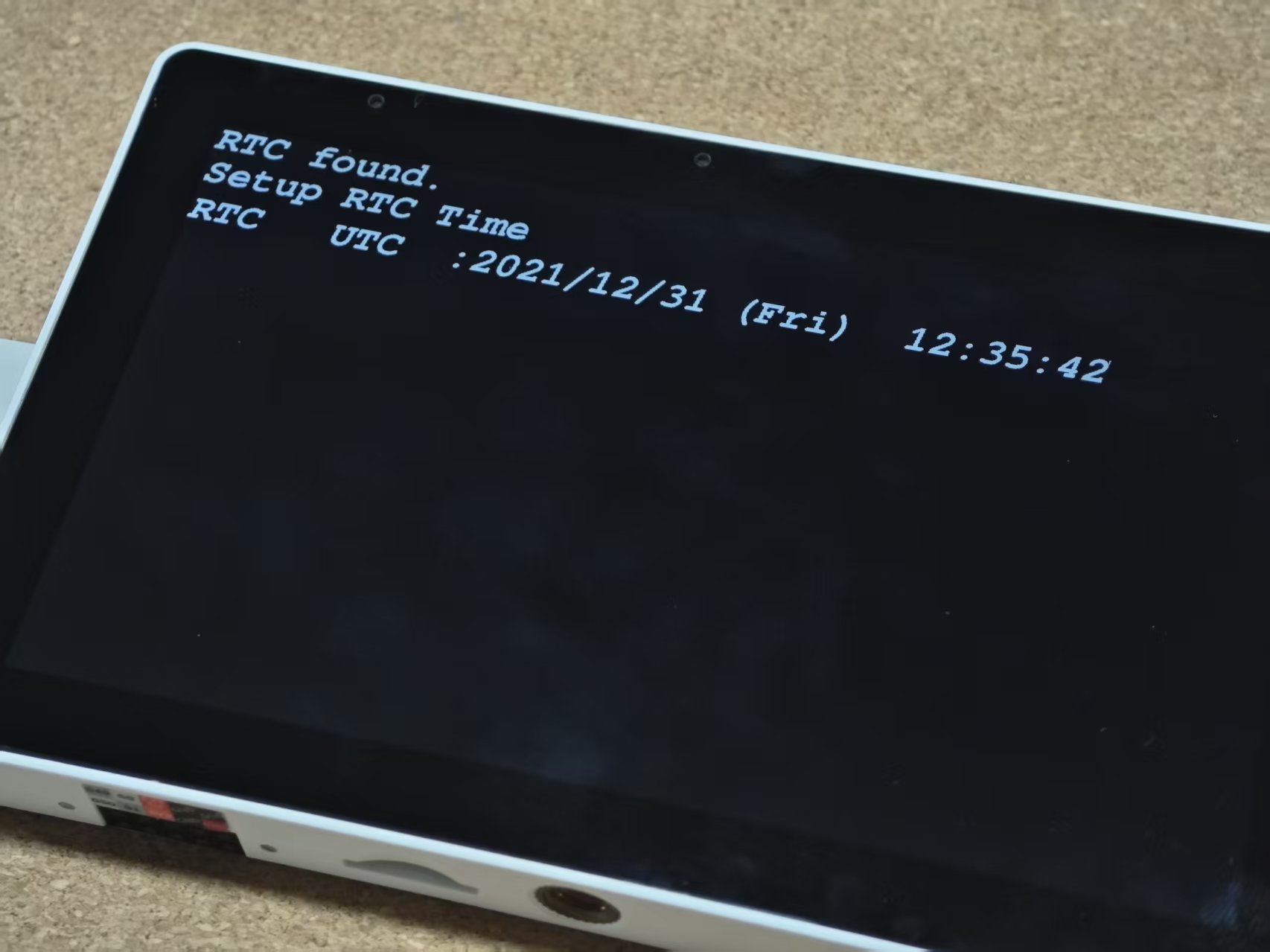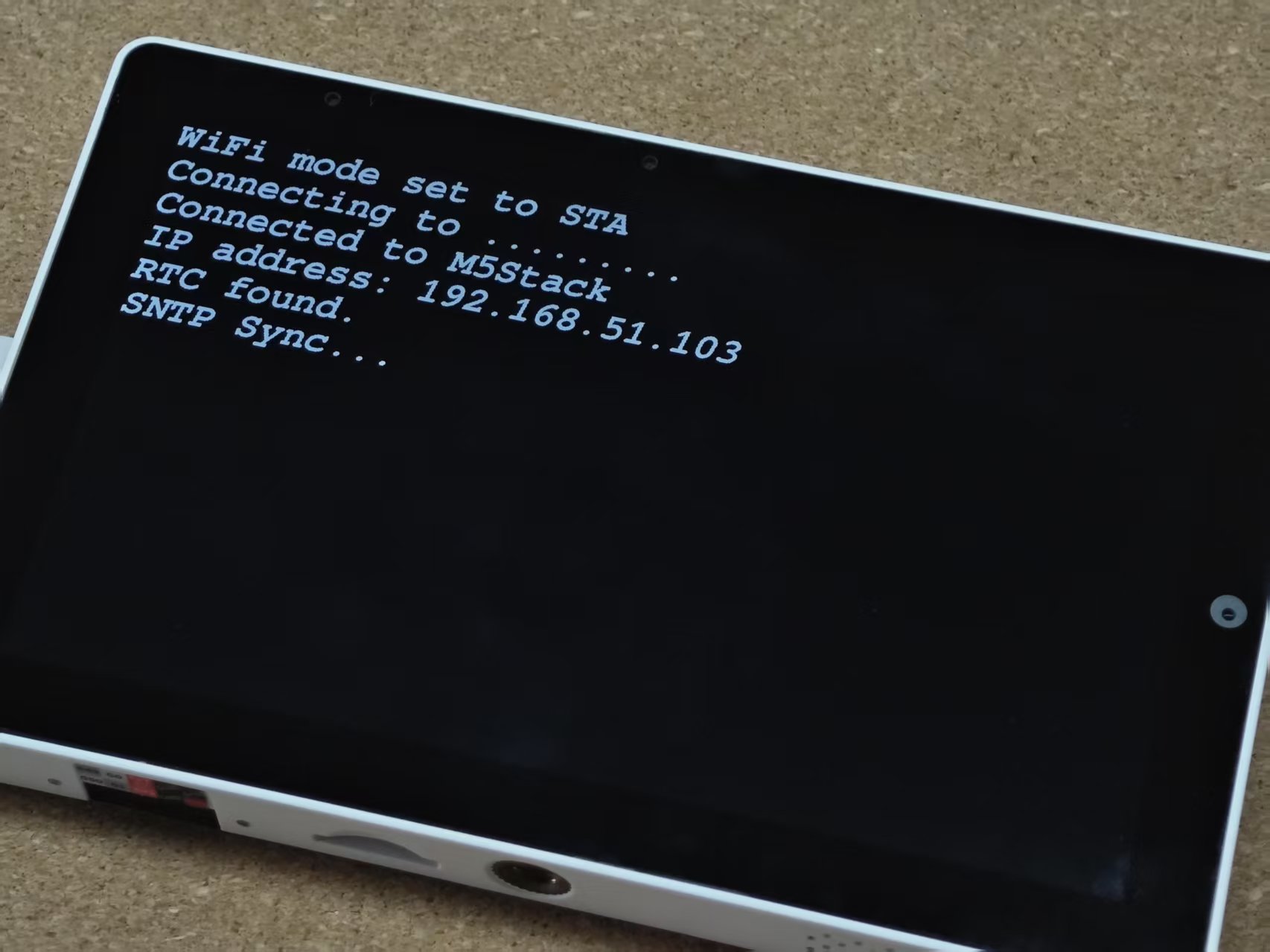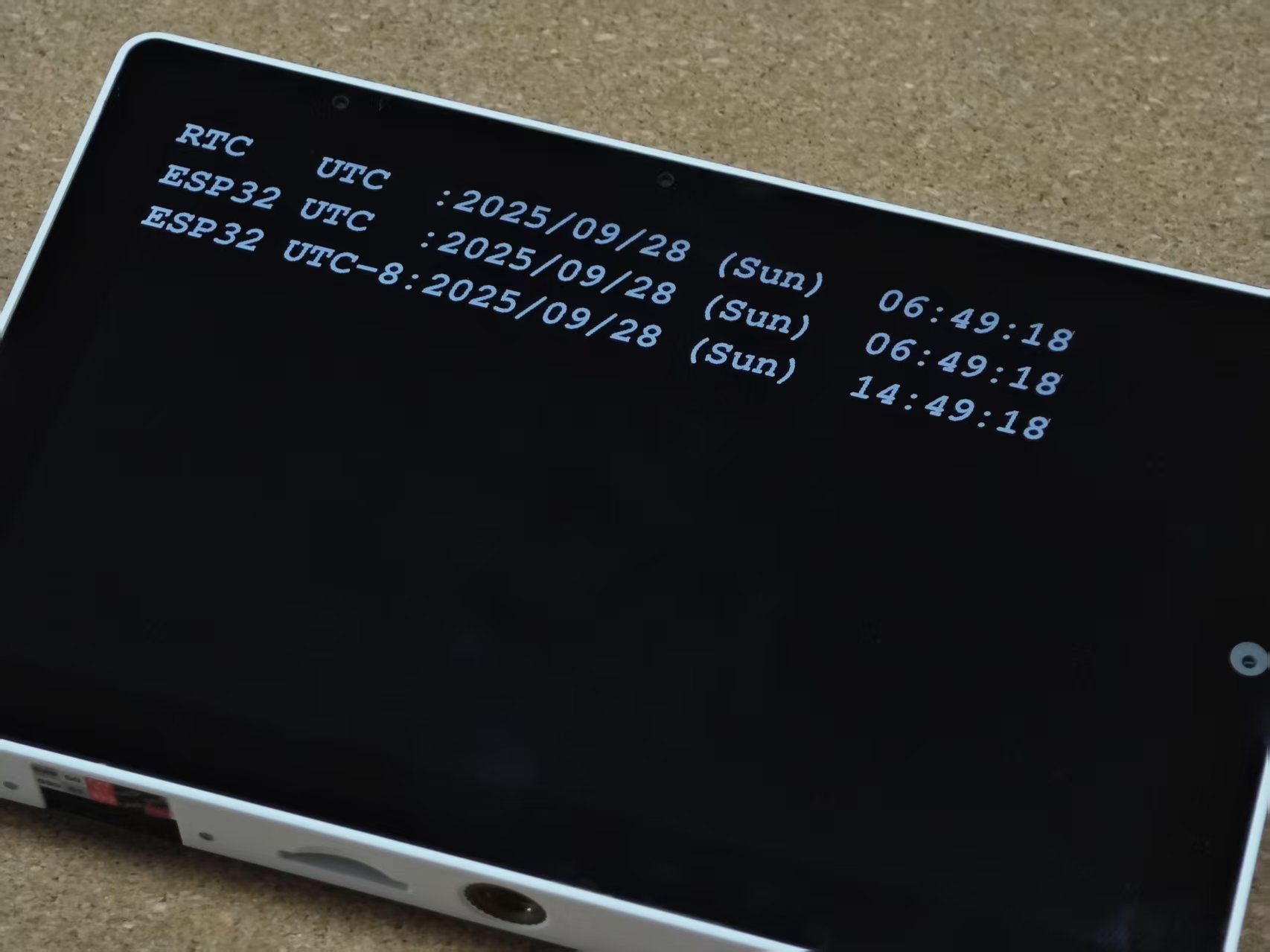Tab5 RTC
Tab5 RTC clock related APIs and case programs.
Example
Compilation Requirements
- M5Stack board manager version >= 3.2.2
- Board selection = M5Tab5
- M5Unified library version >= 0.2.9
- M5GFX library version >= 0.2.14
Configure Local Time
cpp
1 2 3 4 5 6 7 8 9 10 11 12 13 14 15 16 17 18 19 20 21 22 23 24 25 26 27 28 29 30 31 32 33 34 35 36 37 38 39 40 41
#include <Arduino.h>
#include <M5GFX.h>
#include <M5Unified.h>
void setup(void)
{
M5.begin();
Serial.begin(115200);
M5.Display.setFont(&fonts::FreeMonoBoldOblique24pt7b);
M5.Display.setRotation(3);
if (!M5.Rtc.isEnabled()) {
Serial.println("RTC not found.");
M5.Display.println("RTC not found.");
for (;;) {
vTaskDelay(500);
}
}
M5.Display.println("RTC found.");
Serial.println("RTC found.");
M5.Display.println("Setup RTC Time");
M5.Rtc.setDateTime( { { 2021, 12, 31 }, { 12, 34, 56 } } );
delay(1000);
}
void loop(void)
{
static constexpr const char *const wd[7] = {"Sun", "Mon", "Tue", "Wed", "Thr", "Fri", "Sat"};
delay(500);
auto dt = M5.Rtc.getDateTime();
Serial.printf("RTC UTC :%04d/%02d/%02d (%s) %02d:%02d:%02d\r\n", dt.date.year, dt.date.month, dt.date.date,
wd[dt.date.weekDay], dt.time.hours, dt.time.minutes, dt.time.seconds);
M5.Display.setCursor(0, 100);
M5.Display.printf("RTC UTC :%04d/%02d/%02d (%s) %02d:%02d:%02d", dt.date.year, dt.date.month, dt.date.date,
wd[dt.date.weekDay], dt.time.hours, dt.time.minutes, dt.time.seconds);
}
SNTP Network Time
cpp
1 2 3 4 5 6 7 8 9 10 11 12 13 14 15 16 17 18 19 20 21 22 23 24 25 26 27 28 29 30 31 32 33 34 35 36 37 38 39 40 41 42 43 44 45 46 47 48 49 50 51 52 53 54 55 56 57 58 59 60 61 62 63 64 65 66 67 68 69 70 71 72 73 74 75 76 77 78 79 80 81 82 83 84 85 86 87 88 89 90 91 92 93 94 95 96 97 98 99 100 101 102 103 104 105 106 107 108 109 110 111 112 113 114
#define NTP_TIMEZONE "UTC-8"
#define NTP_SERVER1 "0.pool.ntp.org"
#define NTP_SERVER2 "1.pool.ntp.org"
#define NTP_SERVER3 "2.pool.ntp.org"
#include <Arduino.h>
#include <M5GFX.h>
#include <M5Unified.h>
#include <WiFi.h>
#include <esp_sntp.h>
#include <sntp.h>
#define SDIO2_CLK GPIO_NUM_12
#define SDIO2_CMD GPIO_NUM_13
#define SDIO2_D0 GPIO_NUM_11
#define SDIO2_D1 GPIO_NUM_10
#define SDIO2_D2 GPIO_NUM_9
#define SDIO2_D3 GPIO_NUM_8
#define SDIO2_RST GPIO_NUM_15
const char *ssid = "ssid";
const char *password = "password";
void setup(void)
{
M5.begin();
Serial.begin(115200);
M5.Display.setFont(&fonts::FreeMonoBoldOblique24pt7b);
M5.Display.setRotation(3);
WiFi.setPins(SDIO2_CLK, SDIO2_CMD, SDIO2_D0, SDIO2_D1, SDIO2_D2, SDIO2_D3, SDIO2_RST);
// If you select the M5Tab5 board in Arduino IDE, you could use the default pins defined.
// WiFi.setPins(BOARD_SDIO_ESP_HOSTED_CLK, BOARD_SDIO_ESP_HOSTED_CMD, BOARD_SDIO_ESP_HOSTED_D0,
// BOARD_SDIO_ESP_HOSTED_D1, BOARD_SDIO_ESP_HOSTED_D2, BOARD_SDIO_ESP_HOSTED_D3,
// BOARD_SDIO_ESP_HOSTED_RESET);
// STA MODE
WiFi.mode(WIFI_STA);
M5.Display.println("WiFi mode set to STA");
WiFi.begin(ssid, password);
M5.Display.print("Connecting to ");
// Wait for connection
while (WiFi.status() != WL_CONNECTED) {
delay(500);
M5.Display.print(".");
}
M5.Display.println("");
M5.Display.print("Connected to ");
M5.Display.println(ssid);
M5.Display.print("IP address: ");
M5.Display.println(WiFi.localIP());
if (!M5.Rtc.isEnabled()) {
Serial.println("RTC not found.");
M5.Display.println("RTC not found.");
for (;;) {
vTaskDelay(500);
}
}
M5.Display.println("RTC found.");
Serial.println("RTC found.");
M5.Display.println("SNTP Sync...");
configTzTime(NTP_TIMEZONE, NTP_SERVER1, NTP_SERVER2, NTP_SERVER3);
while (sntp_get_sync_status() != SNTP_SYNC_STATUS_COMPLETED) {
Serial.print('.');
delay(1000);
}
Serial.println("\r\n NTP Connected.");
time_t t = time(nullptr) + 1; // Advance one second.
while (t > time(nullptr)); /// Synchronization in seconds
M5.Rtc.setDateTime(gmtime(&t));
M5.Display.clear();
}
void loop(void)
{
static constexpr const char *const wd[7] = {"Sun", "Mon", "Tue", "Wed", "Thr", "Fri", "Sat"};
delay(500);
auto dt = M5.Rtc.getDateTime();
Serial.printf("RTC UTC :%04d/%02d/%02d (%s) %02d:%02d:%02d\r\n", dt.date.year, dt.date.month, dt.date.date,
wd[dt.date.weekDay], dt.time.hours, dt.time.minutes, dt.time.seconds);
M5.Display.setCursor(0, 0);
M5.Display.printf("RTC UTC :%04d/%02d/%02d (%s) %02d:%02d:%02d", dt.date.year, dt.date.month, dt.date.date,
wd[dt.date.weekDay], dt.time.hours, dt.time.minutes, dt.time.seconds);
/// ESP32 internal timer
auto t = time(nullptr);
{
auto tm = gmtime(&t); // for UTC.
Serial.printf("ESP32 UTC :%04d/%02d/%02d (%s) %02d:%02d:%02d\r\n", tm->tm_year + 1900, tm->tm_mon + 1,
tm->tm_mday, wd[tm->tm_wday], tm->tm_hour, tm->tm_min, tm->tm_sec);
M5.Display.setCursor(0, 60);
M5.Display.printf("ESP32 UTC :%04d/%02d/%02d (%s) %02d:%02d:%02d", tm->tm_year + 1900, tm->tm_mon + 1,
tm->tm_mday, wd[tm->tm_wday], tm->tm_hour, tm->tm_min, tm->tm_sec);
}
{
auto tm = localtime(&t); // for local timezone.
Serial.printf("ESP32 %s:%04d/%02d/%02d (%s) %02d:%02d:%02d\r\n", NTP_TIMEZONE, tm->tm_year + 1900,
tm->tm_mon + 1, tm->tm_mday, wd[tm->tm_wday], tm->tm_hour, tm->tm_min, tm->tm_sec);
M5.Display.setCursor(0, 120);
M5.Display.printf("ESP32 %s:%04d/%02d/%02d (%s) %02d:%02d:%02d", NTP_TIMEZONE, tm->tm_year + 1900,
tm->tm_mon + 1, tm->tm_mday, wd[tm->tm_wday], tm->tm_hour, tm->tm_min, tm->tm_sec);
}
}

API
The RTC clock section utilizes the RTC_Class from the M5Unified library. For more related APIs, please refer to the documentation below:
